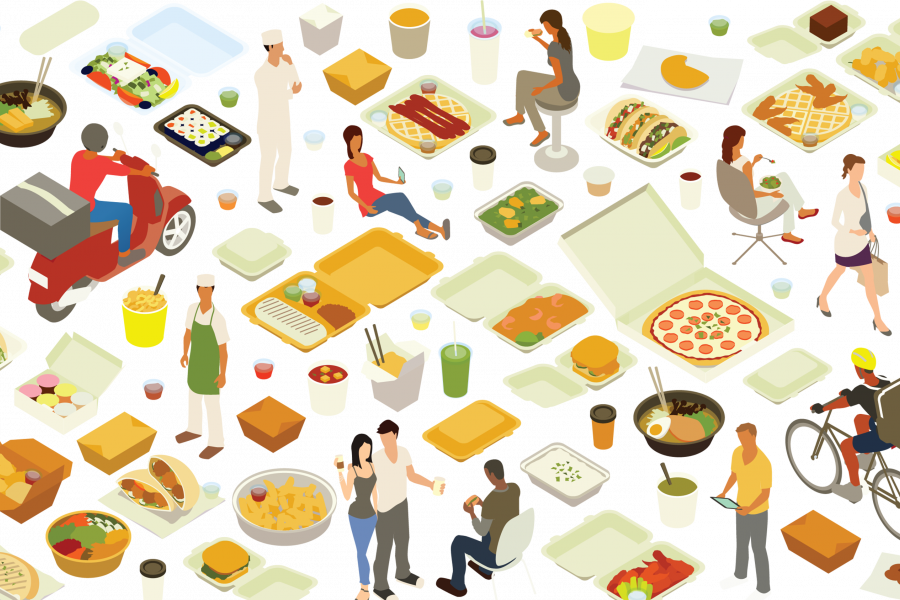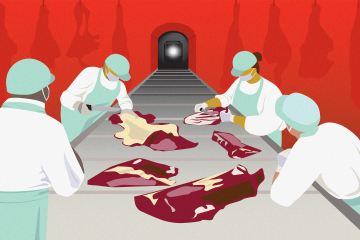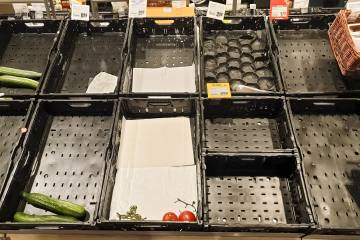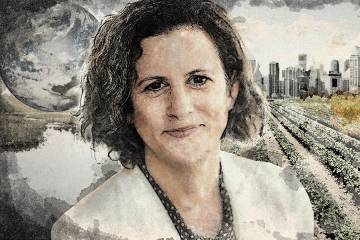Jessica Fanzo has published more than 100 articles based on her research into global food policy and ethics during her 20-plus year career, but her work might have trouble finding its way to consumers. The Bloomberg Distinguished Professor primarily publishes these papers in specialized scholarly journals—American Journal of Clinical Nutrition, The Lancet, Nature—that often require institutional library access to read. They also have academic titles that might cause the average person to wonder how the information contained therein could have anything to do with them—if they ever find themselves flipping through a specialized scholarly journal to pass the time.
But Fanzo clearly, efficiently, and passionately brings her broad expertise to general readers with her first book, Can Fixing Dinner Fix the Planet?, due out in June from the Johns Hopkins University Press. Fixing is the debut book in the Press' new Johns Hopkins Wavelengths series, a collaboration with the Office of Research that aims to bring the work of Bloomberg Distinguished Professors to wider audiences.
Barbra Kline Pope, director of the JHU Press, initially envisioned the series during conversations with Denis Wirtz, vice provost for research, while reading Wirtz's office whiteboard list of the current Bloomberg Distinguished Professors and the number to come. "These are professors who are at the top of their game in interdisciplinary projects," Pope says. That research meant they probably didn't have much time to write a book, but, she adds, "they might be at the stage in their careers where they're thinking, 'I could make a major impact by being able to better communicate about my research to more public audiences.'"
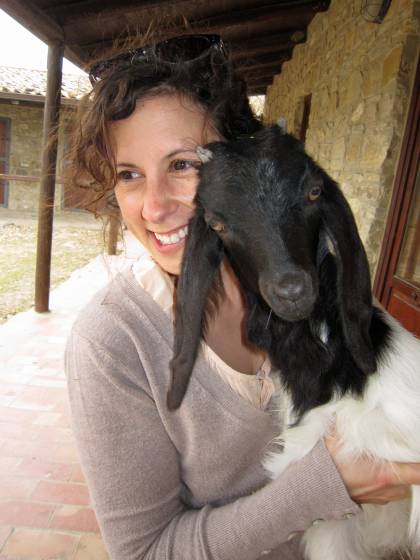
Image credit: Courtesy of Jessica Fanzo
General-reader publications, however, frequently don't count toward tenure. "Often these projects can be seen negatively because they can take away from your academic productivity," says Julie Messersmith, executive director for the Office of Research. She adds that the research community has recognized the importance of getting evidence-based research into the hands of the American public to improve our overall scientific literacy. "There's been a great push in the last several years for more broad science communication, for speaking to wider audiences about the work that happens in research labs and within the so-called ivory tower. That's something that we really wanted to support within the BDP cohort."
Of the 10 books currently in the works, two are set to come out in the summer. In June, Fanzo's book is joined by Lisa Cooper's Why Are Health Disparities Everyone's Problem?. Ashani Weeraratna's Is Cancer Inevitable? and Rexford Ahima's Can the Obesity Crisis Be Reversed? are due out in December. Wavelengths program manager Anna Marlis Burgard is creating public-engagement campaigns for the series and each professor. And for each book, Burgard pairs each professor with a science editor/writer to navigate the brisk writing process and assist in thinking about the storytelling of research in a public way.
Fanzo will speak about her book as part of the Wavelengths: Conversations with JHU's Bloomberg Distinguished Professors virtual panel discussion during Alumni Week. Panelists will also include Wirtz, Pope, and fellow Wavelengths authors Ahima, Cooper, and Weeraratna.
The Hub caught up with Fanzo to talk about food, writing about a global crisis during a global crisis, and why mobilizing matters.
Did writing about a global crisis during a global crisis inform your approach at all? And to what extent do you think this period, when we have witnessed people who occupy positions of power publicly question and refute science, has provided some lived experience for understanding what a "global crisis" means?
That's such a great question because as somebody working on food systems for a while now, people always ask, Why take a systems approach? And to me, COVID-19 is such a great example of a shock that hit a system, the health system, that had implications on every other system: the global economic system, food systems, education systems. It's an unfortunate example of how these systems interact and can quickly become dismantled.
One of the other things that I find so incredibly interesting about COVID-19 is how quickly governments acted—lockdowns, curfews, mandated social distancing. Whether we agree with those approaches or not, it's incredible how quickly governments can act when they feel threatened.
And what I find fascinating is that climate change, hunger in the world, and rising obesity don't elicit the same response. The question is why. Why is it that COVID has created such a reaction? It maybe won't be the most devastating pandemic we'll see in our lifetime. Why don't we see this kind of reaction with climate and food?
I find I had discounted governments a long time ago, thinking they don't act swiftly in tackling some of the biggest challenges we face—but clearly for certain things they do and they can take action. So my question still is, Why don't governments care enough about food and climate to make big, bold changes?
I appreciate that your subject is, simply, food—you're thinking seriously about food. One of my Hopkins professors was the late Sidney Mintz, and I'm pretty sure I once heard Sid say that he wished there were more people thinking about food seriously. In the book you talk about your research path to your current career, but I wanted to know: When you did you realize that you're basically just talking about food?
I started off so micro—I was doing molecular nutrition during my PhD and my postdoc. Over time, I started to think about the impact of my work, and I was really thinking more about the big picture of food and not so much how one nutrient impacts a cellular pathway. I started to expand and think more about how food impacts public health.
I think the moment I realized that food touches on so many aspects of society was when I traveled to Africa and I was working in rural places with smallholder farm households. And you see how central food is to every piece of their life and how their lives depend on that crop that season, and everything is sort of less important—and then you come back to the U.S. and it's the opposite. I think that's when I really realized how critical food is to tradition, to infrastructure, to weather, to everything—working in the field with people who are growing our food. That was what really solidified the centrality of food to me.
The book explores what we, as individual consumers, can do to change the food system, but you get us there by taking us from the soil to the plate by a different route—addressing the wide, interconnected back end of the food system that consumer-focused "foodie" culture ignores. Can individual choices still make a difference at this point in the climate crisis?
As a person you wonder what your impact would be in the world, but I think also what the book shows is how globally connected food systems are. You see it when you walk into your grocery store and where your food is coming from. It's often not coming from your local community. It's coming from China, it's coming from South America, it's coming from the far reaches of the world. So I think the idea of this connectivity and collectiveness, if everyone were to make changes in their diet, which is necessary, we could have a profound impact on food systems.
It's a "we-are-all-in-this-together" problem—like the pandemic, like climate change. If one country or one group doesn't do something, we won't solve the problem. If the U.S. doesn't take action on climate, the rest of the world is not going to be able to address climate change. It's the same with food, and the complexity with food is that we all eat every day, multiple times. This collective choice matters a lot, but some countries and some individuals need to make bigger impacts than others, just because their environmental footprint is bigger. It's this idea of thinking of yourself as a global citizen and that the system that you live and shop in and buy food from every day is highly connected to Africa, India, China, everywhere.
That touches on my next question. I appreciate that your chapter about what the individual can do includes mobilization, and that you come out and say, "Policymaking is not only the domain of government." I just wondered if you can talk about the role of organizing and collectivization that people are trying to employ to wrestle with this food crisis that we're facing.
One of the biggest things we can do is citizen mobilization. Look at the youth climate surge and the engagement of young people in climate. It's incredible. I wish we had that with food. We don't yet have a food movement, but the UN Food Systems summit will gather this September, and there's a significant youth coalition that will be present at the summit. They can make all the difference—it is their food system, it is their future.
The summit will be a moment where we see a lot of younger people engaging in food justice issues. Think of 1968 to '73 and the activism among university students and young people against the Vietnam War and how it scared the hell out of policymakers. It scared the hell out of Richard Nixon, right? Can we have that in the food space? Can we have some radicalism?
We are in dire need of a food revolution. And to say we need to leave it all to governments—that's just not going to happen. We have a history of real mistrust of the government. So that's why civil society and faith-based organization movements are so key to mobilize and empower communities to take local action and the way they want to see their food systems shaped. Leaving it all to the government is not a great idea and leaving it all on the backs of consumers and citizens is also not a good idea. We need all of it.
You open the book—as in, your first sentence—saying you didn't see yourself being in this career you have now. The book itself explores how your research, going from a bench scientist to somebody doing fieldwork and looking at systems, shaped your ideas and thinking. As a scientist, did you gain anything by moving from the micro to the macro?
Having the experience of working in bench science, it's such a hard slog and I'm so glad I don't spend 18 hours a day in a laboratory harvesting cells. But that work ethic required to do basic science—it gave me the grounding I needed to do rigorous research in any situation. The nutrition community suffers a bit from sticking to worldviews and ideology. I think that's something I learned early on, not being ideological in your viewpoint because you can always be proven wrong. That has carried me through—a sort of humbleness, because in lab sciences, you have to be so humble because almost all the time nothing works!
Also see
You mentioned food radicalism: What are other actions or topics or things that you feel don't get brought up enough when we're talking about food and that we should be thinking about more—or at least raise awareness of and bring into the conversations we're having?
Food is more central to the climate conversation, but many people are excluded from food systems because of their race, ethnicity, or caste. Those who are producing the world's food are often the most food insecure in the United States, for example. Our food system workers are underappreciated and often are unprotected, but still, day in and day out, they are harvesting our food. It's the "people piece" in food systems that is still not totally central to food systems conversations—which often focus more on technological fixes.
The food system exacerbates and highlights these systemic inequities, but they still, at the end of the day, involve larger issues outside the food system. We can fix the food system, but we need to get to the larger injustices that exist in our society.
As [environmental scholar and author] Ellen Silbergeld would say, worker safety is food safety, because we won't have a healthy food supply if we're not including the people who pick and prepare foods in that discussion.
Exactly. I mean, Sidney Mintz wrote about this for years. I mean, his sugar book, Sweetness and Power, is at the core of this power issue, and that book was published almost 40 years ago. We're still dealing with the same issue today in food systems; these power imbalances between transnational companies and governments remain unresolved.
How has your work changed your own eating habits?
It influences me a lot. I try to eat a climate-friendly diet. I don't consume lots of meat. I try to eat healthy and support local farmers. I don't grow any of my own food—people on my team actually grow their own food—but I am not a farmer myself, and I always feel like a hypocrite talking about farming! But I try to be aware of where food comes from and in trying to eat sustainably, not wasting food, fewer plastics. But I'm in a privileged position—and I make bad food decisions every day. I'm human. What makes food so wonderful is that it connects us all.
Posted in Voices+Opinion, Politics+Society
Tagged bloomberg distinguished professorships, jessica fanzo, food systems




